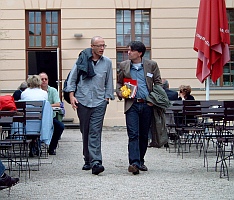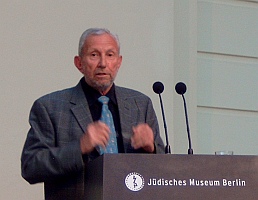Bund and Borders: German Jewish thinking between Faith and Power
Program
Click here for a printable pdf-Version.
May 17
18.00: Opening of the Conference
Greetings: Cilly Kugelmann (Jewish Museum Berlin), Martin Salm (Stiftung "Erinnerung, Verantwortung und Zukunft"), Roland Hain (Studienstiftung des deutschen Volkes), Raphael Gross (Leo Baeck Institute London, Jewish Museum Frankfurt a.M., Fritz Bauer Institute)
Introduction: Nitzan Lebovic (Jewish Museum Berlin)
18:30–20:30: Evening Session
A German-Jewish Critique?
German-Jewish scholars of the twentieth century often employed a refined system of critique to probe key ethical issues. Whether in league with or pitted against Protestant and Catholic theology, Idealism and Romanticism suggested to these creative figures new ways of engaging with their subjects. When identity was formed in relation to progress and urbanization, some thinkers — one thinks of Georg Simmel, Walter Benjamin, Franz Rosenzweig, Paul Celan – argued in favor of a new conception of finality and history. Is it possible to define such critical attempts as a specifically German-Jewish ethics or culture? Was there a specifically German-Jewish perspective of critical thinking?
This panel will examine critical articulations in German-Jewish history from the Fin de Siècle to the 1950s; the goal is a description of the relation between ethical concerns and critical concepts.
Presentations:
Steven Aschheim (Hebrew Univ.): Icons Beyond Their Borders: The German-Jewish Intellectual Legacy at the Beginning of the 21st Century
Amir Eshel (Stanford Univ.): Futurity - On Paul Celan's poetry and thought
Adi Gordon (Univ. of Wisconsin): 'East' and 'West' as Central European-Jewish Critique - The Case of Hans Kohn
Commentator and Chair: Thomas Meyer (Simon Dubnow Institute Leipzig)
20.30–22.00: Reception
May 18
10.00–12.00: Morning Session
German-Jewish Intellectual Positions from Mystical Traditions to Radical Politics
Modern German Jewry involved an unconventional alliance between mysticism and radical politics. Martin Buber, Gershom Scholem, Ernst Simon, Hans Kohn, and Hans Jonas are just a few of the twentieth-century figures who tried to reshape the heritage of Chassidism, Kabbalah, and Gnosticism to suit the new Jewish state.
This panel will reexamine the alliance between innovation and political radicalism, asking whether the renewed interest in a mystical tradition was a condition or a result of new critical tendencies.
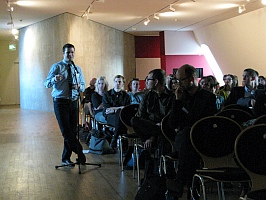
- Samuel Spinner asking
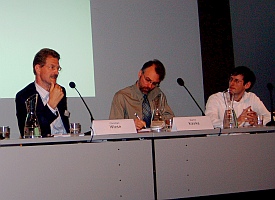
- Christian Wiese, Martin Kavka, Udi Greenberg
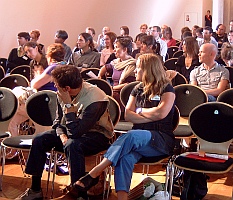
- Participants
Presentations
Martin Kavka (Florida State Univ.):The Success of the Desire - Verification in Martin Buber
Christian Wiese (Sussex Univ.): No 'Love for the Jewish People'? Hans Jonas's Controvery with Hannah Arendt over 'Eichmann in Jerusalem' revisited
Commentator: Udi Greenberg (Hebrew Univ.)
Chair: Cilly Kugelmann (Jewish Museum Berlin)
12.00–13.30: Lunch
14.00–16.0: Afternoon Session I
A Jewish Political Theology
Jacob Taubes redefined Carl Schmitt’s concept of political theology in terms of Jewish religious traditions, posing a series of questions: What is the task of political theology in a world very different from the one Schmitt knew? How did it become such a hotly debated topic? How should it be contextualized?
This panel will discuss the notion of a Jewish political theology in light of recent developments in the field, including the forthcoming publication of the Taubes-Schmitt correspondence (ZfL Berlin) and the forthcoming translation of Taubes’s Vom Kult zu Kultur (Stanford).
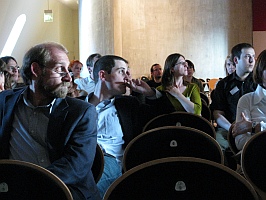
- Participants
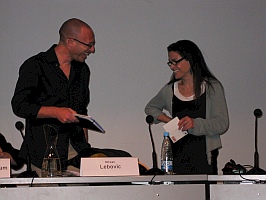
- Nitzan Lebovic, Vivian Liska
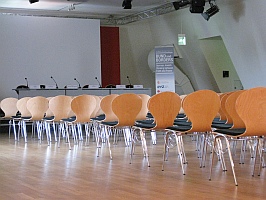
- Lecture theatre
Presentations
Vivian Liska (Univ. of Antwerp): Giorgio Abamben and the Legacy of Walter Benjamin's Messianism
Nitzan Lebovic (Tel Aviv Univ.): Between Bund and Border - The Israeli Case
Menachem Lorberbaum (Tel Aviv Univ.): Two Concepts of Theocracy
Commentator and Chair: Martin Treml (Zentrum für Literaturforschung Berlin)
15.00–16.30: Refreshments
16.30–18.30: Afternoon Session II
The Impact of German Jews on Political Culture and Constitutional Issues in Israel
Intellectual reflections on recent political developments often turn to the work of Leo Strauss on the one hand, and Hannah Arendt on the other. The history of law in the twentieth century was shaped by another figure: Hans Kelsen. Are the reflections of Kelsen, Strauss and Arendt on constitutionalism helpful in considering today’s political problems? Are they relevant for the situation in Israel? What are the chances of a constitutional frame for Israeli politics? What sorts of limitations would a constitution face?
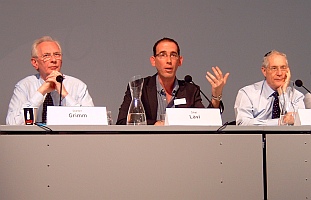
- Dieter Grimm, Shai Lavi, Izhak Englard

- Mordechai Kremnitzer
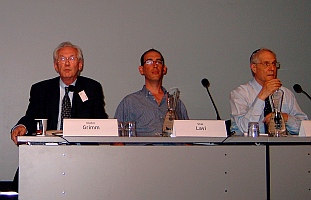
- Dieter Grimm, Shai Lavi, Izhak Englard
Presentations
Mordechai Kremnitzer (Institute for Democracy Jerusalem): The Impact of German-Jewish Jurists on the Israeli Legal System
Izhak Englard (Hebrew Univ. em./Israeli Supreme Court em.): The Impact of Kelsen's Theory in Israel
Shai Lavi (Tel Aviv Univ.): Punishment and the Revocation of Citizenship in the United Kingdom, the United States, and in Israel
Commentator: Alexandra Kemmerer (Simon Dubnow Institute Leipzig)
Chair: Dieter Grimm (Humboldt Univ. em./Wissenschaftskolleg Berlin)
19.00–21.00: Dinner
May 19
10.00–12.00: Workshops with Students I
- Politics meets Halakhic and Chassidic traditions (with Menachem Lorberbaum)
- Carl Schmitt and Jacob Taubes (with Martin Treml)
- Ethical considerations and aesthetic forms (with Vivian Liska)
- An Israeli Constitution? (with Mordachai Kremnitzer)
12.30–13.30: Lunch
14.00–16.00: Workshops with Students II
17.00–18.30: Evening Round Table
The End of German-Jewish History ?
Is German-Jewish history at its final curve, dying with the generation that helped to shape it? Intellectual and political developments may suggest otherwise, but key academic institutions are quickly moving funds to other areas. This panel will debate the state and future of German-Jewish history and thought, in the context of a general decline of interest in European history as a whole.

- Raphael Gross

- Steven Aschheim
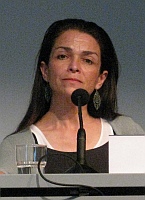
- Vivian Liska
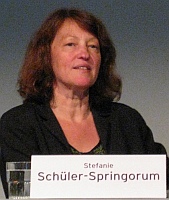
- Stefanie Schüler-Springorum
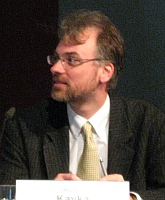
- Martin Kavka
Contributions: Vivian Liska (Univ. of Antwerp), Steven Aschheim (Hebrew Univ.), Martin Kavka (Florida State University), Stefanie Schüler-Springorum (Hamburg Univ.), Nitzan Lebovic (Tel Aviv Univ.)
Chair:Raphael Gross (LBI London, Jewish Museum/Fritz Bauer Institute, Frankfurt a.M.)
19.00: End of the Conference
